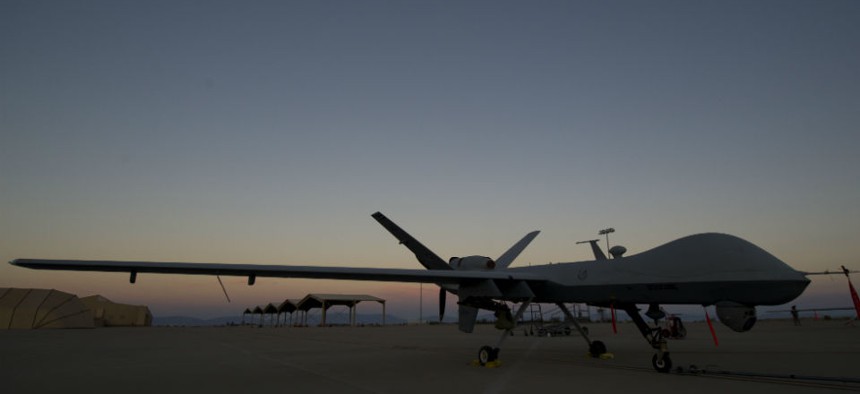
An MQ-9 Reaper drone awaits maintenance at Holloman Air Force Base, N.M. 1st Class Aaron Montoya/U.S. Air Force
Air Force Doubles Bonus Pay for Drone Pilots
Eligible personnel will receive monthly incentive pay of $1,500 -- up from the current rate of $650.
The Air Force is significantly increasing the monthly incentive pay for drone pilots to help combat the stressful job’s high turnover rate, according to the department.
Secretary Deborah Lee James on Thursday authorized the bump in incentive pay to $1,500 per month -- more than double the current monthly rate of $650. James said that the Air Force realizes the stress drone pilots are under and the department plans to explore “more permanent incentive plans.”
Drone pilots on average work 14-hour days, six days a week, James said. Pilots in the “remotely piloted aircraft” world log between 900 and 1,100 flight hours per year, compared to between 200 and 300 hours annually for the average pilot flying manned Air Force aircraft. Drone pilot training is rigorous, and the craft is nerve-wracking “because mistakes can cost lives,” James said during a “State of the Air Force” press briefing Thursday.
RPA pilots must meet certain criteria, including six years of service after completing undergraduate drone pilot training, to be eligible for the retention bonuses, the department said. The Air Force said “a handful” of drone pilots will begin receiving the increased incentive pay toward the end of fiscal 2015, though the memo is effective immediately. “This authority is intended as a stopgap measure and is expected to be superseded by a future RPA compensation program,” stated the memo from James to the Air Force assistant secretary for manpower and reserve affairs.
There are about 1,000 active-duty RPA pilots for the Predator and Reaper drones; the department needs more than 1,200. Roughly 240 RPA pilots leave the Air Force each year.
“Airmen who operate RPAs on a daily basis have delivered time critical data,” James said Thursday. “They have prosecuted targets and supported our combatant commanders without fail. But this pace has been unrelenting. And so it's critical that we address these problems now.”
In addition to the extra compensation for eligible drone pilots, the Air Force will tap the National Guard and Reserves to help relieve some of the pressure, and will “seek recently-qualified active duty RPA pilot volunteers to deploy for six months to some of these distressed RPA units,” said James. The department also will delay the return of some RPA pilots who were on detail to their original posts.
A 2012 RAND Corp. report looked at incentive pay in the drone pilot world, and its usefulness as a retention tool. “For the Air Force, there is a tipping point at which it becomes cheaper to retain a trained individual than to recruit and train a new one,” the report said. “Even if this tipping point is not reached, incentive pays may be needed to meet experience requirements.”
James’ decision to boost bonuses for RPA pilots comes just weeks before the Military Compensation and Retirement Modernization Commission will release its recommendations on reforming service members’ pay and benefits. The proposed changes, which officially will be unveiled Feb. 1, could affect a range of third-rail military compensation issues, including commissary benefits, housing allowances and the pension system.
Defense Secretary Chuck Hagel told troops this week that major changes to the military compensation system are likely as a result of the highly-anticipated commission recommendations, according to a Jan. 15 report in Military Times.







